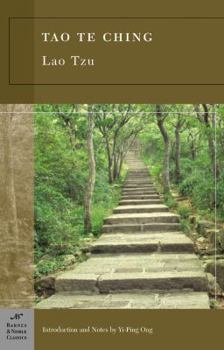Tao Te Ching
Select Format
Select Condition 
Book Overview
&&LITao Te Ching&&L/I, by &&LBLao Tzu&&L/B, is part of the &&LIBarnes & Noble Classics&&L/I&&LI &&L/Iseries, which offers quality editions at affordable prices to the student and the general reader, including new scholarship, thoughtful design, and pages of carefully crafted extras. Here are some of the remarkable features of &&LIBarnes & Noble Classics&&L/I: New introductions commissioned from today's top writers and scholars Biographies of the authors Chronologies of contemporary historical, biographical, and cultural events Footnotes and endnotes Selective discussions of imitations, parodies, poems, books, plays, paintings, operas, statuary, and films inspired by the work Comments by other famous authors Study questions to challenge the reader's viewpoints and expectations Bibliographies for further reading Indices & Glossaries, when appropriate All editions are beautifully designed and are printed to superior specifications; some include illustrations of historical interest. &&LIBarnes & Noble Classics &&L/Ipulls together a constellation of influences--biographical, historical, and literary--to enrich each reader's understanding of these enduring works.&&LP style="MARGIN: 0in 0in 0pt" &&L/P&&LP style="MARGIN: 0in 0in 0pt"Epigrammatic, enigmatic, intensely poetic, the &&LITao Te Ching&&L/I is the mystical, spiritual soul of Taoism, one of the three great religions (along with Confucianism and Buddhism) of ancient China. The Tao is usually translated as "the way" or "the path," but it is better understood as a universal life force that flows around and through all things. The &&LITao Te Ching&&L/I teaches us that happiness is found in becoming one with the Tao, which enables us to live in harmony, balance, and peace and to develop the virtues of humility, moderation, and compassion.&&LBR&&LBRTaoism emphasizes "non-dualistic" thinking and the interconnectedness of all life. The "dualistic thinker" looks at the world and sees differences, comparisons, and contrasts. The Taoist sage knows that all such judgments depend on the person making them, not on the reality of what is being judged. Unlike theistic (God-centered) religions, Taoism does not involve prayer to a deity. Instead, Taoists meditate on the wisdom in the &&LITao Te Ching&&L/I, seeking to unravel the paradoxes and understand the complexities that lie within its simple language.&&LBR&&L/P&&LP style="MARGIN: 0in 0in 0pt"&&LSTRONGYi-Ping Ong&&L/B&&L/B graduated with a B.A. in Philosophy from Columbia University and a second B.A. in Philosophy and Theology from Oxford University. She is currently completing her Ph.D. in Philosophy at Harvard.&&L/P
Format:Paperback
Language:English
ISBN:1593082568
ISBN13:9781593082567
Release Date:March 2005
Publisher:Barnes & Noble Classics
Length:175 Pages
Weight:0.44 lbs.
Dimensions:0.6" x 5.4" x 8.0"
Customer Reviews
5 ratings
This is the best translation I’ve found by Stephen Mitchell. Love this book
Published by Calberkeley11 , 1 month ago
I like how this book is translated (Stephen Mitchell) and laid out. Have so many copies and give them away
Peg Streep’s translation is bad.
Published by Luka , 1 month ago
Peg Streep’s translation is bad.
Buy it!
Published by A.K. , 1 year ago
Great book- a classic & influential text
A must-read of Taoism
Published by Joey , 1 year ago
Great book!
A Timeless Masterwork
Published by Alex , 4 years ago
When I saw a less than four star rating for this book, I was flabbergasted! How can one rate a world classic so poorly?
Perhaps it's the nature of the book itself. The Tao Te Ching (or Deodejing) is 81 chapters of wisdom, political, spiritual, and advice sayings. Without understanding any of the philosophical background assumptions, the book is difficult to understand and can seem like nonsense at times. The Tao Te Ching is also unique in encouraging reflection and meditation on it's sayings by virtue of it's delicate balance between clarity and ambiguity.
All of this can turn those new to the text away. But if you really want to understand the book, you will find it richly rewarding! Properly understood, the wisdom contained therein is helpful, profound, and a good starting point for exploring other ideas in Taoist, Buddhist, and Indian philosophy.
It's also a calming and beautifully written book, given a competent translation. Most translations are fine, but I definitely recommend Red Pine's, Minford's, Addis and Lombardo's, or any one of ones listed on this site that isn't Stephen Mitchell. Mitchell's translation is not horrible, he just adds too much to the text for my tastes.
As for a good introduction to the Tao Te Ching, Tao: The Watercourse Way is the best I've found. In any case, however, this book deserves five stars. There are great reasons why it is considered such an essential text in so many countries!






